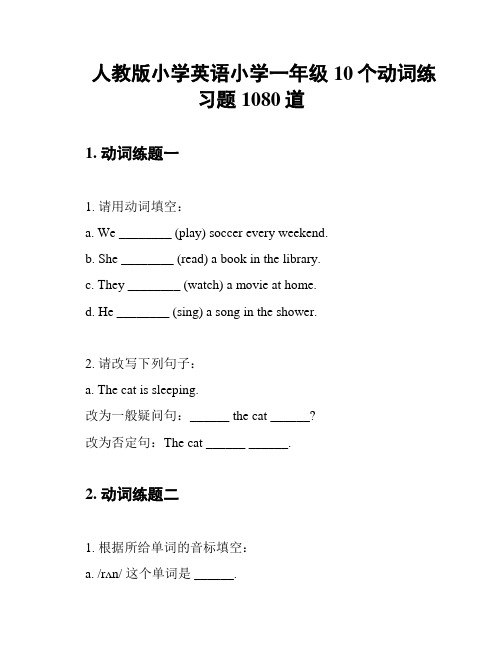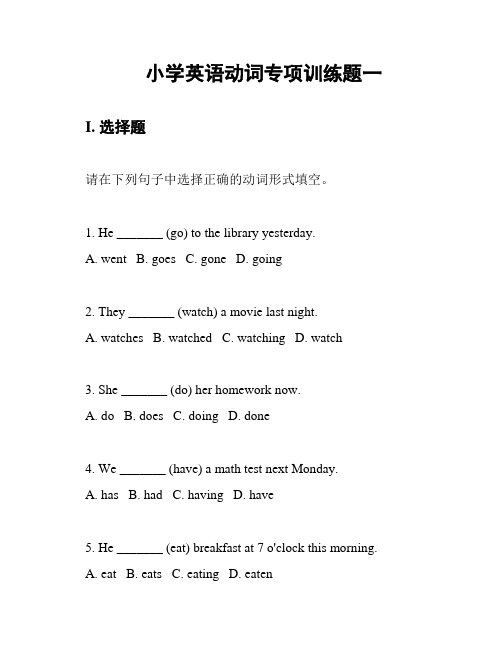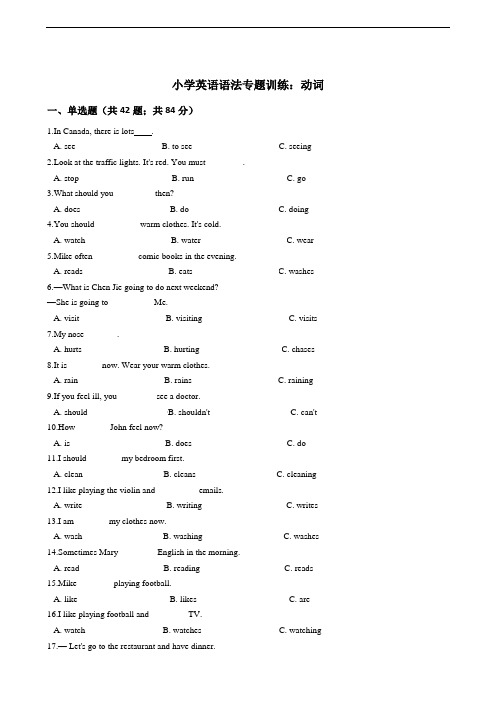小学英语动词及专项训练
人教版小学英语小学一年级10个动词练习题1080道

人教版小学英语小学一年级10个动词练习题1080道1. 动词练题一1. 请用动词填空:a. We ________ (play) soccer every weekend.b. She ________ (read) a book in the library.c. They ________ (watch) a movie at home.d. He ________ (sing) a song in the shower.2. 请改写下列句子:a. The cat is sleeping.改为一般疑问句:______ the cat ______?改为否定句:The cat ______ ______.2. 动词练题二1. 根据所给单词的音标填空:a. /rʌn/ 这个单词是 ______.b. /dæns/ 这个单词是 ______.c. /driŋk/ 这个单词是 ______.2. 根据图片选择正确的动词:a. The dog is ______.b. The cat is ______.c. The bird is ______.3. 动词练题三1. 根据句意填空:a. We ______ TV in the evening.b. She ______ her friend this morning.c. They ______ a cake for the party.d. He ______ to music every day.2. 请改写下列句子:a. I am playing with my toys.改为一般疑问句:______ you ______ with your toys?改为否定句:______ ______ playing with my toys. ...依此类推,直到1080道题目完成。
小学英语动词专项训练题一

小学英语动词专项训练题一I. 选择题请在下列句子中选择正确的动词形式填空。
1. He _______ (go) to the library yesterday.A. wentB. goesC. goneD. going2. They _______ (watch) a movie last night.A. watchesB. watchedC. watchingD. watch3. She _______ (do) her homework now.A. doB. doesC. doingD. done4. We _______ (have) a math test next Monday.A. hasB. hadC. havingD. have5. He _______ (eat) breakfast at 7 o'clock this morning.A. eatB. eatsC. eatingD. eatenII. 填空题请根据句子意思,用正确的动词形式填空。
1. My mother _______ (cook) dinner every evening.2. They _______ (play) soccer in the park yesterday afternoon.3. We _______ (visit) my grandparents last weekend.4. The cat _______ (sleep) on the sofa now.5. She _______ (do) her homework and then _______ (go) out to play.III. 改写句子请将下列句子改写为含有情态动词的句子。
1. He can ride a bike.2. She knows how to swim.3. They are able to speak English.4. We must finish our work before lunch.5. You should study hard every day.IV. 完成句子请根据所给的提示,完成下列句子。
小学英语语法专题训练:动词(含答案)

小学英语语法专题训练:动词一、单选题(共42题;共84分)1.In Canada, there is lots .A. seeB. to seeC. seeing2.Look at the traffic lights. It's red. You must ________.A. stopB. runC. go3.What should you _________then?A. doesB. doC. doing4.You should __________warm clothes. It's cold.A. watchB. waterC. wear5.Mike often __________comic books in the evening.A. readsB. eatsC. washes6.—What is Chen Jie going to do next weekend?—She is going to __________Me.A. visitB. visitingC. visits7.My nose _______.A. hurtsB. hurtingC. chases8.It is _______ now. Wear your warm clothes.A. rainB. rainsC. raining9.If you feel ill, you ________ see a doctor.A. shouldB. shouldn'tC. can't10.How _______ John feel now?A. isB. doesC. do11.I should _______ my bedroom first.A. cleanB. cleansC. cleaning12.I like playing the violin and _________ emails.A. writeB. writingC. writes13.I am _______ my clothes now.A. washB. washingC. washes14.Sometimes Mary ________ English in the morning.A. readB. readingC. reads15.Mike________ playing football.A. likeB. likesC. are16.I like playing football and ________ TV.A. watchB. watchesC. watching17.— Let's go to the restaurant and have dinner.— That _______interesting.A. soundsB. cleansC. shows18.— I have got a new book and a stamp about China. What about you? — I have got a new book about China, too. But I_______got a stamp.A. haveB. don't haveC. haven't19.Lin Tao can __________.A. drawB. drawsC. drawing20.—______you got a new stamp?— Yes, I have.A. HaveB. DoC. Are21._______ is her hobby.A. RunningB. RunsC. Runing22.Let's________to Chinatown now.A. to goB. goC. going23.Let's ______ to the park tomorrow.A. goingB. to goC. go24.I _______you can pass the exam. Because you work very hard.A. believeB. eatC. say25.—_______you got a hobby?— Yes, I have.A. DoB. AreC. Have26.—Can you speak English?—Yes, I _______.A. doB. haveC. can27.________table tennis is my hobby.A. PlayB. PlayingC. Plays28.Can you ________ my pen friend?A. areB. amC. be29.Look at the library_______. It says, "Don't talk in the room."A. ruleB. roomC. sound30.—I don't know what to do. Can you help me?—You _______think it hard by yourself.A. doB. shouldC. will31.— Do you understand me?— Yes, because I can_____a little English.A. speakB. tellC. say32.My sister can _______ pictures.A. drawB. drawsC. drawing33.Look! The girl is ________ a football game.A. lookingB. seeingC. watching34.—______you______cars?—Yes, I do.A. Have; gotB. Do; collectC. Are; having35._______ is my hobby.A. Collecting stampsB. Collecting stampC. Collect stamps36.My father likes at the weekends.A. going to fishB. go fishingC. going fishD. going fishing37.Did Nancy after school?A. walk homeB. walk to homeC. walked to homeD. walk to the home38.My father often __________stories to us in the evening.A. tellsB. talkC. saysD. speaks39._______ your mother see a film yesterday evening?A. AreB. DidC. WasD. Is40.He could not _________ his book.A. findB. look afterC. foundD. looked41.My mother likes __________new clothes and she can_________ nice clothes.A. make; makeB. making; makesC. making; makeD. making; making42.I'm going to ___________ him English.A. teachsB. teachesC. teach二、填空题(共1题;共1分)43.—What's your hobby?—________(collect stamps) is my hobby. It's my stamp album (册子).三、选词填空(词汇运用)(共5题;共5分)44.He works very hard and ________ (stay/stays) healthy.45.—How ________ (do/does) he go to work?—By car.46.—What does Linda ________ (look like/like)?—She is thin and short.47.I think we should ________ (goes/go) to Shanghai first.48.She________ (can't/can) walk, she is too young.四、语法填空(共1题;共1分)49.Lets________ (play) basketball this weekend.五、单词拼写(词汇运用)(共1题;共6分)50.写出下列动词的第三人称单数形式。
小学英语动词不定式用法小结及练习

小学英语动词不定式用法小结及练习一、动词不定式的形式动词不定式是动词的一种形式,由“to+动词原形”构成。
例如:to study, to play, to eat等。
二、动词不定式的用法1. 用作动词的宾语:- I want to go to the park.(我想去公园。
)- She likes to play soccer.(她喜欢踢足球。
)2. 用作动词的主语:- To learn English is important.(研究英语很重要。
)- To eat fruits is good for your health.(吃水果对健康有益。
)3. 用作形容词的补语:- I am happy to help you.(我很高兴帮助你。
)- She is eager to learn new things.(她渴望研究新东西。
)4. 用作副词的补语:- He went to the zoo to see the animals.(他去动物园看动物。
)- She ran fast to catch the bus.(她跑得很快以赶上公交车。
)5. 用作名词的补语:6. 用作介词的宾语:- Are you ready to start the game?(你准备好开始比赛了吗?)- She is excited to go on a trip.(她很兴奋去旅行。
)练:1. 请将下列句子中的划线部分改为动词不定式形式:- I like swimming in the pool. → I like to swim in the pool.- They want playing soccer. → They want to play soccer.2. 请填入适当的动词不定式形式:- My dream __________ (be) a teacher.- He needs __________ (study) harder for the exam.3. 请根据句意选择动词不定式的正确形式填空:- She decided ______ (go) to the movie with her friends. 以上是动词不定式的用法小结及相关练。
小学英语情态动词知识点及练习

情态动词【知识要点】:情态动词(Modal verbs)本身有一定的词义, 表示语气的单词。
但是不能独立作谓语, 只能和动词原形一起构成谓语。
情态动词用在行为动词前, 表示说话人对这一动作或状态的看法或主观设想。
情态动词虽然数量不多, 但用途广泛, 主要有下列: can (could), may (might), must, need, ought to, dare (dared), shall (should), will (would) must not.情态动词无人称和数的变化, 情态动词后面跟的动词须用原形, 否定式构成是在情态动词后面加 "not"。
疑问形式是将情态动词提至主语前。
个别情态动词有现在式和过去式两种形式, 过去式用来表达更加客气, 委婉的语气, 时态性不强, 可用于过去, 现在或将来。
情态动词属非及物动词, 故没有被动语态。
【典型例题】:【专题一】:can和could的用法【例1】Can you lift this heavy box?(体力)【解析】表示能力(体力、知识、技能)【练习】1.Mary speak three languages.(知识)2... yo.skate?(技能)此时可用be able to代替。
Can只有一般现在时和一般过去式;而be able to 则有更多的时态。
I’ll not be able to come this afternoon.当表示“经过努力才得以做成功某事”时应用be able to,不能用Can。
【例2】-----Can I go now?----.Yes.yo.can..No.yo.can’t.【解析】表示请求和允许。
此时可与may互换。
在疑问句中还可用could,might 代替,不是过去式,只是语气更委婉,不能用于肯定句和答语中。
【练习】---- I come to see you tomorrow?---.Yes.yo.....----No.yo..../I’.afrai.not.【例3】Can this be true?【解析】表示推测(惊讶、怀疑、不相信的态度),用于疑问句、否定句和感叹句中。
六年级英语动词用法练习题及答案

六年级英语动词用法练习题及答案一、选择题。
1. - _______ you like pizza?- Yes, I _______.A. Do, doB. Are, areC. Does, doD. Do, does2. The cat _______ milk every day.A. drinkB. drinksC. ateD. eats3. My sister _______ to the park last Sunday.A. goB. goesC. wentD. going4. - _______ Bob and Tim play basketball?- Yes, they _______.A. Do, doB. Are, areC. Does, doD. Do, does5. We _______ television every evening.A. watchB. watchesC. watchedD. watching二、用括号内所给动词的适当形式填空。
1. He usually _______ (go) swimming on weekends.2. Yesterday, they _______ (visit) the museum.3. The dog _______ (bark) loudly last night.4. We _______ (play) soccer every Saturday.5. She _______ (cook) dinner for her family every day.三、改错题。
下面每句话中有一处错误,请找出并改正。
1. I doesn't like to eat vegetables. _______2. They was playing basketball in the park. _______3. He don't want to go to the party. _______4. We goes to the movies last night. _______5. She have a lot of friends at school. _______答案一、选择题。
最新小学英语动词及专项训练
小学英语动词及专项训练1.动词的定义:表示动作或状态的词叫做动词。
表示动词的词如ask ,walk 等2.动词的分类:(1)实义动词又叫行为动词,能独立做谓语:如open,hold , learn (2)系动词又称连系动词,不能独立做谓语,后边必须接表语组成系表结构,说明主语的状态、性质、特征等:be 动词(3)助动词,主要协助动词构成谓语动词词组的词叫做助动词。
它本身没有词义,和实义动词一起构成各种时态和语态,也可构成否定或疑问结构:do、will、should、would(4)情态动词,表示说话人对有关行为或事物的态度和看法,认为其可能、应该或必要等。
由于词义不完全,不能单独作谓语,要后接动词完成谓语部分:must、can、could、may、will3.动词的基本形式(1)动词原形:动词未经任何变化的原来形式。
如:have、cut、see(2)第三人称单数现在时:动词一般现在时的第三人称单数形式的构成和名词复数构成法相似。
A.直接加“ s” :read--reads leave---leavesB.以 e 结尾的动词,直接加“ s ” : come--comes close---closesC.以s. x. sh. ch.o结尾的单词,加“ es ” : watch---watches fix---fixes wash---washes go--goesD.以“辅音字母+y”结尾的单词,变“ y”为“ i”, 再加“ es” : cry---criesE.以“元音字母+y”结尾的单词,直接加“ s” :play---plays(3)过去式的变化规则:A.直接加“ ed”:look--looked watch---watchedB.以 e 结尾的动词,直接加“ d” : live--lived love--lovedC.以“辅音字母+y”结尾的单词,变“ y”为“ i”, 再加“ed ”: cry---criedD.以“元音字母+y”结尾的单词,直接加“ s ” :play---playedE. 动词不规则变化表Infinitive Pasttense Infinitive Past tense1. am, is was2. keep kept3. are were4. let let5. become became6.make made7. begin began8. meet met9. bite bit10 put put11. blow blew12. read read13. buy bought14. ride rode15. catch caught16.run ran17. come came18.say said19. cost cost20. see saw21. cut cut22. sing sang23.dig dug24. sit sat25.do did26 sleep slept27. draw drew28.speak spoke29. drink drank30.sweep swept31. eat ate32. take took33.fall fell34.teach taught35. feed fed36.tell told37.feel felt38.think thought39. fly flew40. throw threw41.forget forgot 42.understan dunderstood43. get got44.give gave45. wake woke46.go went47. wear wore48.grow grew49. win won50.have/has had51. write wrote52.know knew53 .break broke4.动词的时态一、一般现在时: 表示经常性、规律性习惯性的动作或现在存在的状态。
小学英语动词专项练习(解析版答案)
动词专项练习一(解析版答案)一、找出不同类的单词。
(B)1、 A. ate B. fly C. bought D. did解析:ate、bought、did是动词过去式,fly是动词原形,故选B(D)2、 A. run B. swim C. walk D. her解析:run、swim、walk是动词原形, her是人称代词(A)3、 A.want B.went C.played D.cooked解析:want是动词原形,went、played、cooked是动词过去式(C)4、 A.took B.did C.swim D.hurt解析:took、did、hurt是动词过去式,swim是动词原形。
(C)5、 A.read B.could C.drink D.came解析:read、could、came是动词过去式,drink是动词原形。
二、用be动词的适当形式填空(做此类题目应当遵从主谓一致原则,主语是单数,be动词是单数形式,主语是复数,be动词是复数形式)1、 Is your father a worker. Yes, he is.解析:your father主语,属于第三人称单数,遵从主谓一致原则,所以后面的Be动词应是is.2、They are in the classroom.解析:They是人称代词,是复数形式,遵从主谓一致原则,所以后面的Be动词应是are.3、Where are my books?解析:books是名词复数形式,遵从主谓一致原则,所以Be动词应是are4、These are her pears.解析:pears是名词复数形式,遵从主谓一致原则,所以Be动词应是arethe T-shirt??5、How much is the T-shirt解析:how much 意为“多少钱”时,可单独使用,也可构成词组how much money,但英语中常省略money,用来询问某物的价钱、价格。
小学英语用所给动词适当形式填空专项练习
小学英语用所给动词适当形式填空专项练习以下是一组用所给动词的正确形式填空的专项练:1.我每天坐公交车去学校。
(go)2.他每周日散步。
(go)3.上周末,XXX和她的父母去了一家农场。
(go)4.让我们去看看吧。
(go。
see)5.你明天打算做什么?我打算去野餐。
(go。
have)6.你有一个炉子,她有一个开罐器。
(have)7.你什么时候吃早饭?我七点钟一刻吃早饭。
(have)8.你们需要什么?他们需要一条毯子。
(have)9.你在做什么?我在上英语课。
(have)10.昨天我玩得很开心。
(have)11.你明天打算做什么?我打算去野餐。
(have)12.你喜欢什么?我喜欢鸭肉。
(like)13.她喜欢什么?她喜欢拍照。
(like。
take)14.他喜欢种花吗?(plant)15.上周日我在家看电视。
(watch)1.XXX.2.XXX at home。
but they were in the park earlier.3.I do not like cats。
XXX.4.Public signs can have different meanings.5.Would you like to go shopping with me?6.Where were you yesterday morning。
I was in bed due to illness.7.They are not playing XXX.8.Is Miss Li from Nanjing。
No。
she is from Shanghai.9.There XXX。
All the students are very excited.10.What do you usually do on Sundays。
I usually do my homework.11.There is no milk in the glass currently。
小学英语动词用法训练题
小学英语动词用法训练题在小学英语的学习中,动词的用法是一个非常重要的知识点。
为了帮助同学们更好地掌握动词的用法,以下是一些精心设计的训练题。
一、选择题1、 I ______ football every dayA playB playsC playing答案:A解析:“I”是第一人称,后面接动词原形,所以选 A。
2、 She ______ singingA likeB likesC liking答案:B解析:“She”是第三人称单数,后面的动词要加“s”,所以选 B。
3、 They ______ to school by busA goB goesC going答案:A解析:“They”是复数,后面接动词原形,选 A。
4、 We ______ our homework in the eveningA doB doesC doing答案:A解析:“We”是复数,动词用原形,A 选项正确。
5、 He ______ TV on SundaysA watchB watchesC watching答案:B解析:“He”是第三人称单数,动词要加“es”,所以选 B。
二、用所给动词的适当形式填空1、 Look! The girls ______ (dance)答案:are dancing解析:“Look!”表示正在进行的动作,用现在进行时,结构是“be +动词的现在分词”,“girls”是复数,be 动词用“are”,“dance”的现在分词是“dancing”。
2、 My father often ______ (read) books in the evening答案:reads解析:“often”表示经常做的事情,用一般现在时,“My father”是第三人称单数,动词加“s”。
3、 The children ______ (have) a picnic last weekend答案:had解析:“last weekend”表示过去的时间,用一般过去时,“have”的过去式是“had”。
- 1、下载文档前请自行甄别文档内容的完整性,平台不提供额外的编辑、内容补充、找答案等附加服务。
- 2、"仅部分预览"的文档,不可在线预览部分如存在完整性等问题,可反馈申请退款(可完整预览的文档不适用该条件!)。
- 3、如文档侵犯您的权益,请联系客服反馈,我们会尽快为您处理(人工客服工作时间:9:00-18:30)。
小学英语动词及专项训练 LELE was finally revised on the morning of December 16, 2020小学英语动词及专项训练1.动词的定义:表示动作或状态的词叫做动词。
表示动词的词如ask ,walk等2.动词的分类:(1)实义动词又叫行为动词,能独立做谓语:如open,hold , learn(2)系动词又称连系动词,不能独立做谓语,后边必须接表语组成系表结构,说明主语的状态、性质、特征等:be动词(3)助动词,主要协助动词构成谓语动词词组的词叫做助动词。
它本身没有词义,和实义动词一起构成各种时态和语态,也可构成否定或疑问结构:do、will、should、would(4)情态动词,表示说话人对有关行为或事物的态度和看法,认为其可能、应该或必要等。
由于词义不完全,不能单独作谓语,要后接动词完成谓语部分:must、can、could、may、will3.动词的基本形式(1)动词原形:动词未经任何变化的原来形式。
如:have、cut、see(2)第三人称单数现在时:动词一般现在时的第三人称单数形式的构成和名词复数构成法相似。
A.直接加“s”:read--reads leave---leavesB.以e结尾的动词,直接加“s ”: come--comes close---closesC.以s. x. sh. 结尾的单词,加“es ” : watch---watches fix---fixes wash---washes go--goesD.以“辅音字母+y”结尾的单词,变“y”为“i”, 再加“es” : cry---criesE.以“元音字母+y”结尾的单词,直接加“s” :play---plays(3)过去式的变化规则:A.直接加“ed”:look--looked watch---watchedB.以e结尾的动词,直接加“d” : live--lived love--lovedC.以“辅音字母+y”结尾的单词,变“y”为“i”, 再加“ed ”: cry---criedD.以“元音字母+y”结尾的单词,直接加“s ”:play---playedE.动词不规则变化表Infinitive Pasttense Infinitive Past tense1. am, is was2.keep kept3. are were4.let let5. become became6.make made7. begin began 8. meet met9. bite bit 10. put put11. blow blew 12.read read13. buy bought 14.ride rode15. catch caught 16.run ran17. come came 18.say said19. cost cost 20.see saw21. cut cut 22. sing sangdug 24.sit satdid 26. sleep slept27. draw drew 28.speak spoke29. drink drank 30.sweep swept31. eat ate 32. take took33.fall felltaught35. feed fed 36.tell toldfelt thought 39. fly flew 40.throw threwforgot understood43. get got 44.give gave45. wake woke 46.go went47. wear wore 48.grow grew49. win won 50.have/has had51. write wrote 52.know knew53 .break broke4.动词的时态一、一般现在时: 表示经常性、规律性习惯性的动作或现在存在的状态。
结构:1. 动作词一般用原形,但如果是第三人称单数时(如Tony ,he ,she ),动作词用第三人称单数形式,即加s 或 es ;在主语前加do, does帮助疑问句,后面的动词用原形;在动作词前加don’t, doesn’t 帮助否定句,后面的动词用原形。
2. 句子中没动作词时,用be动词:is , am , are ;is , am , are 放在主语前帮助疑问句;is , am , are 后面加上not帮助否定句。
3. 情态动词can, may, should,must引起的句子是一般现在时,后面接动词用原形;can, may, should,must 放在主语前帮助疑问句,后面接动词用原形;can, may, should, must后面加上not帮助否定句,后面接动词用原形。
4. 肯定祈使:动词原形 + 其它否定祈使句:Don’t +动词原形 + 其它5.感叹句: What a mess! What a beautiful desert! What beautiful flowers! ——What+(形)名How beautiful! How beautiful the flower is! How beautiful the flowers are! ——How+形A. :(非第三人称单数)主语+V+其它 We come from China.(第三人称单数)主语+Vs+其它 He comes from China.主语+be (is, am, are)+其它 We are from China.主语+情态动词(can, may, should, must)+V+其它 She must go.B. :(非第三人称单数)主语+don’t +V+其它 We don’t come from China.(第三人称单数) 主语+doesn’t +V+其它He doesn’t come from China.主语+be (is, am, are) not+其它 I aren’t from China.主语+情态动词(can, may, should, must)+not +V+其它C.一般:Do +(非第三人称单数)主语+V+其它 Do you come from China?Does +(第三人称单数)主语+Vs+其它 Does he come from China?be (Is, Am, Are)+主语+其它 Are you from China?情态动词(Can, May, Should, Must)+主语+ V+其它She can’t go.D.特殊疑问句:+do +(非第三人称单数)主语+V+其它 Where do you come from?+does +(第三人称单数)主语+Vs+其它 Where does he come from?+be (is, am, are)+主语+其它Where are you from?+情态动词(Can, May, Should, Must)+主语+ V+其它Can she go?二、现在进行时: 表示现在正在进行的动作。
结构:1. be动词( is , am , are) + 动词ing (现在分词);is , am , are 放在主语前帮助疑问句,后面的动词加ing;is , am , are 后面加上not帮助否定句,后面的动词加ing。
A. :主语+be(is, am, are)+Ving+其它 They are coming here.B. 否定句:主语+be(is, am, are)+not +Ving+其它They aren’t coming here.C. 一般疑问句:be(Is, Am, Are)+主语+ Ving+其它Are they coming here?D. :特殊疑问词+ be(is, am, are)+主语+ Ving+其它 What are they doing?三、一般过去时:表示过去某个时间里发生了的动作或状态。
结构:1. 动作词用过去式(ed ) ;在主语前加did帮助疑问句,后面的动词用原形;在动作词前加didn’t帮助否定句,后面的动词用原形。
2. 句子中没动作词时,用be动词的过去式:was , were;was , were 放在主语前帮助疑问句;was , were后面加上not帮助否定句。
A. :主语+Ved+其它 We came from China主语+be (was, were)+其它 We were from China.B. :主语+didn’t +V +其它 We didn’t come from China.主语+be (was, were) +not+其它 We weren’t from China.C.一般:Did +主语+V +其它 Did you come from China?be (Was, Were)+主语+其它 Were you from China?D.特殊疑问句:特殊疑问词+ did +主语+V +其它 Where did you from?特殊疑问词+ be (was, were)+主语+其它 Where were from?四、一般将来时:表示将来某个时间的动作或状态。
结构:1. be going to + 动词原形is , am , are 放在主语前帮助疑问句;is , am , are 后面加上not帮助否定句。
2. will+ 动词原形will放在主语前帮助疑问句,后面接动词用原形;will后面加上not帮助否定句,后面接动词用原形。
A. :主语+will +V +其它 He will dig a hole.主语+ be going to +V +其它 He is going to dig a hole.B. :主语+will not +V +其它 He won’t dig a hole.主语+ be not going go +V +其它 He isn’t going to dig a hole.C.一般:Will+主语+V+其它 Will he dig a hole?Be(Is, Am, Are) +主语going to +V+其它 Is he going to did a hole?D.特殊疑问句:特殊疑问词+will+主语+V+其它 What will he do?特殊疑问词+be(is, am, are) +主语going to +V+其它What is he going to do?五、过去进行时:表示过去某时正在进行的动作。
结构:1. be动词( was, were) + 动词ing;was, were 放在主语前帮助疑问句,后面的动词加ing;was, were后面加上not帮助否定句,后面的动词加ing。
